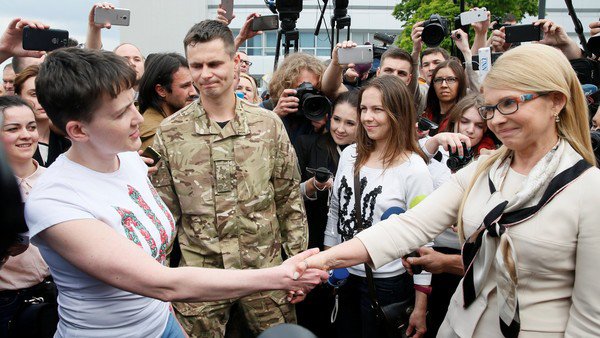Analysis
The return of ‘Top Gun’ could derail Poroshenko
Russian President Vladimir Putin may have had something other than “humanitarian reasons” in mind when he sent imprisoned Ukrainian pilot Nadia Savchenko home.

The boys of Ukraine’s anti-Russian Aidar Battalion, considered by Amnesty responsible for war crimes, “are certainly not saints, but they are good guys and they are patriots.” Russian President Vladimir Putin, however, is “a louse.”
Those were the words of Nadia Savchenko, 35, the Ukrainian pilot sentenced to 22 years in prison in Russia, upon her return to Ukraine, where she was welcomed as a hero. Actually it was the Putin who approved the prisoner exchange with Kiev, evoking the Cold War to some, while other analysts read in it a gesture of Moscow relaxing toward Kiev.
The prisoner swap came as Ukraine declared in arbitration in London that it would not fulfill the €3 billion debt payment to Russia because “Moscow has invaded Ukraine,” proving that it does not want to give Kiev the possibility to repay this debt. The tense situation is evidently connected with the story of the Ukrainian pilot.
The Russian president justified the decision to grant Savchenko’s homecoming for “humanitarian reasons,” and some wonder whether, in fact, the Russian president’s act is not a poisoned move to put Poroshenko in more difficulty. His position is already faltering because Ukrainian civil society blames him for the comatose state of the economy, the persistence of corruption and for his involvement in the Panama Papers scandal.
The Top Gun, a kind of legend among the Ukrainians, appears to be opposing the incumbent president: It is not by accident that many of the international media have written that Putin’s gesture “poses a thorn in the side of Poroshenko’s presidency.” Not only to him, it is true that Savchenko, who was elected to the Ukrainian parliament while imprisoned in Russia, in the ranks of Yulia Tymoshenko’s “Fatherland” party, another woman with a heroine past in Ukraine. When she got off the plane, she was welcomed by the former “Gas Queen” who walked ahead to embrace the soldier.
The latter, rigid and martial, instead offered a much more lukewarm handshake to the party boss, who then took her to the Kiev Rada. She also refused the bouquet of flowers offered to her when she got off the plane. It is said that Savchenko could quit Tymoshenko’s party and create one of her own, composed by her “patriotic” friends, or what remains of the most extreme right that after a moment of true popular uprising, has been able to put hands and helmets on the Maidan.
Savchenko, after all, behaves like the typical “badass,” as the Americans would say. A “tough cookie,” the first woman committed among the Ukrainian soldiers in Iraq, she has been in the Donbass as a volunteer, working with the Ajdar battalion, one of the most ambiguous and nationalistic, with openly Nazi members.
She was then arrested by the Russians and delivered to Moscow, where she was accused of illegally crossing the border and being responsible for the death of two journalists. The Russian court sentenced her to 22 years in prison.
During the process, Savchenko showed the middle finger to the judges, she went on a hunger strike and she sang the Ukrainian anthem during the ruling. She did everything to stir the deepest feelings of Ukrainian nationalists: those anti-Russian ones. The entire international community, despite her nationalism dangerously bordering on neo-fascism, worked on her release: the United States, Germany, the European Union.
So much so that when she was released, Savchenko thanked “the international community” and used “peaceful” words, although she has declared she is ready to return to fight for her “Motherland” and said that — if the Ukrainian people ever wanted it — she could also become the future president.
She did not have any words of thanks for Poroshenko, who awarded her the Star of the Hero. It is not a coincidence that after Nadia’s pseudo-electoral proclamation, frost fell on the Ukrainian political scene. So those who thought Putin had made this move to embarrass the “Chocolate King” would be right.
Savchenko was exchanged for Alexander Alexandrov and Yevgeny Yerofeyev, two Russians captured by Ukrainians who had been sentenced to 14 years. According to Kiev, they were members of the Russian secret services, proving Moscow’s involvement in the Donbass. According to Russia, they were just two ordinary citizens.
If that were the case, observers have wondered, why did Putin trade a prisoner of Savchenko’s caliber with two far less known and unimportant people. Savchenko’s arrival in Kiev and the political detonation that could follow would seem to confirm the intuitions of the Russian president, perhaps.
On the one hand, there would be an attempt to preserve the possibility of a lasting peace, thanks to the gesture of sending the Ukrainian Top Gun home; on the other hand, it could undermine president Poroshenko, driving Ukraine into permanent political and economic chaos. The exchange of prisoners took place at a time when black lists of Western and Russian journalists emerged from Kiev, confirming the fascist trend of the Ukrainian government that came after the Maidan.
Originally published at http://ilmanifesto.info/il-ritorno-a-kiev-di-nadia-insidia-poroshenko/ on 2016-05-29
